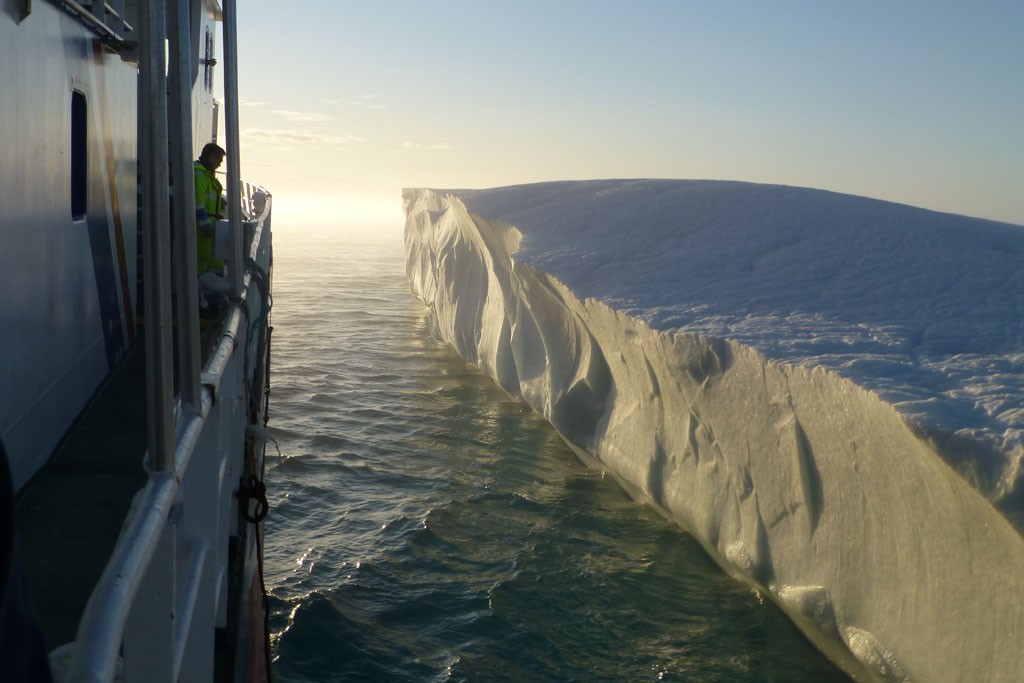Unknown mechanism which breaks up tabular icebergs at sea discovered
by British Antarctic survey/BBC Operation Iceberg on 2 Nov 2012

Operation Iceberg BBC
A previously unknown mechanism by which large tabular icebergs break up out at sea, as part of a study carried out on the Peterman Iceberg in Baffin Bay over the summer, has been discovered by an international team of scientists. Scientists observed that the gradual creation of a huge underwater ice foot produced so much buoyancy that it broke large chunks off the main iceberg thus causing the iceberg to slowly disintegrate. This discovery was captured on camera as a film crew followed the expedition for Operation Iceberg, a two part BBC Two series going out this week.
Scientists have long assumed the decay of icebergs was either caused by wave action physically splitting them apart, or by warmer sea water gradually melting them. The truth now appears to be an interesting combination of factors. During the arctic expedition, scientists found that warm surface water, aided by wave action, erodes a deep notch around the edge of the iceberg. This notch is at water level, and the unsupported ice above the notch quickly sloughs away. Over time this creates a large underwater 'ram' or ice foot sticking out which is protected by colder, deeper water. This underwater ram creates so much buoyant upwards pressure that it finds a weak point within the iceberg which then snaps off. This can be a sizeable chunk of ice. During filming for Operation Iceberg, camera crews and scientists were aboard the iceberg when a chunk of ice, 200m by 50m, broke off in this way.
Dr Keith Nicholls of the British Antarctic Survey was on the two week expedition. He argues that the notch is the key start to this process. In the programme he says: 'The reason this iceberg is breaking up really fast in front of us is all about what’s happening at the wave cut in the warm water layer right at the surface.'
Also on the expedition was one of the world leading experts on ice science, Prof Peter Wadhams of Cambridge University, who believes their observation of the process is unique: 'We have discovered a new mechanism. People don’t normally sit beside melting icebergs in a ship. Normally when they come across an iceberg they give it a wide berth. So in a way, we’re the first people to be doing it.'
Alon Stern of New York University was responsible for taking the temperature measurements of the sea water around the iceberg, including key data gathered by the BBC’s dive team. These readings confirmed that the deeper water measured -1.5 degrees Celsius, and was therefore able to protect the ice foot from melting.
Understanding the mechanism by which icebergs break up is important for shipping in the North Atlantic. It is also becoming clear that because of climate change, the number of tabular icebergs in Arctic seas is increasing. Keith Nicholls added: 'In recent years we’ve been seeing a lot more big tabular icebergs come off the Greenland ice sheet and they’re now ending up in Baffin Bay. That’s a change and the only reason that can change is because the climate around Greenland is changing.'
To watch the team in action, tune into Operation Iceberg, at 9pm on BBC Two on Tuesday 30th of October and Thursday first of November.
You can read Dr Keith Nicholls' blog here.
http://www.antarctica.ac.uk/" target="_blank">British Antartic Survey website
If you want to link to this article then please use this URL: www.sail-world.com/103439

